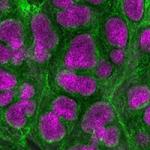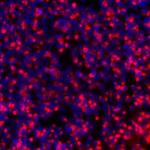
Research Topics
The overall goals of the Developmental Neuroscience Section are to identify the molecular and cellular factors that play a role in the development of the sensory epithelium of the mammalian cochlea (the organ of Corti). The organ of Corti is comprised of at least 6 distinct cell types that are arranged in highly conserved mosaic. The generation of a specific number of each cell type and the arrangement of these cell types into a regular pattern are essential for the normal perception of sound; however, our understanding of the factors that play a role in the development of this structure is extremely limited.
Biography
Dr. Kelley received his B.A. from Cornell University and his Ph.D. from the University of Virginia. Following a post-doctoral fellowship at the University of Washington, he became an Assistant Professor in the Department of Cell Biology at Georgetown University in 1996. In 2000 he moved to the NIDCD, first as Acting Chief and then (since 2004) as Chief of the Developmental Neuroscience Section. In 2010 he became Chief of the Laboratory of Cochlear Development. Dr. Kelley's laboratory works on the cellular and molecular development of the mammalian cochlea.
Selected Publications
- Kolla L, Kelly MC, Mann ZF, Anaya-Rocha A, Ellis K, Lemons A, Palermo AT, So KS, Mays JC, Orvis J, Burns JC, Hertzano R, Driver EC, Kelley MW. Characterization of the development of the mouse cochlear epithelium at the single cell level. Nat Commun. 2020;11(1):2389.
- de Haan S, He J, Corbat AA, Belicova L, Ratz M, Vinsland E, Frisén J, Kelley MW, Andersson ER. Ectoderm barcoding reveals neural and cochlear compartmentalization. Science. 2025;388(6742):60-68.
- Driver EC, Northrop A, Kelley MW. Cell migration, intercalation and growth regulate mammalian cochlear extension. Development. 2017;144(20):3766-3776.
- Coate TM, Spita NA, Zhang KD, Isgrig KT, Kelley MW. Neuropilin-2/Semaphorin-3F-mediated repulsion promotes inner hair cell innervation by spiral ganglion neurons. Elife. 2015;4.
- McInturff S, Burns JC, Kelley MW. Characterization of spatial and temporal development of Type I and Type II hair cells in the mouse utricle using new cell-type-specific markers. Biol Open. 2018;7(11).
Related Scientific Focus Areas
This page was last updated on Thursday, August 21, 2025




